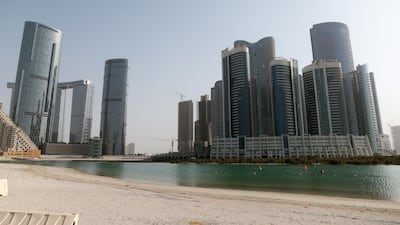Tenants are finding themselves in an increasingly strong position as the depressed property market squeezes landlords’ profits, according to industry experts.
In addition to generous discounts, landlords are offering tenants added extras and more flexible ways to pay, with options of up to 12 monthly instalments - an option which unheard of in previous years.
One landlord with about 150 apartments on Reem Island across three towers in Marina Heights is already renting out empty properties for monthly payments.
And an entire tower on Reem will be rented out for 12 monthly payments when it is released in the next couple of months, The National understands.
In addition to making the properties easier to rent, agents say that offering tenants more flexible ways to pay provides landlords with another benefit – larger returns.
Landlords typically receive a premium of around 2 to 5 per cent more for 12 cheque payments as opposed to one.
“If you are looking to get above market rent, then you have to offer something else,” says Ben Crompton, managing partner of Crompton and Partners, one of the brokers for the apartments on Reem being leased for 12 monthly payments.
Mr Crompton said the option to pay in more cheques could become more popular going forward. But 12 cheques will not necessarily become the norm, as there are barriers, namely the financial risk that the arrangement poses to landlords.
It is more difficult for individual owners to offer 12 monthly payment options because of the difficulties in pursuing people if a cheque bounces, said Mr Crompton. If one of the cheques bounces, the landlord still has to pay their mortgage.
But it could become more popular with owners with a lot of properties.
“If you have 100 apartments and one or two default, you still have the income from others so you can spread your risk much more easily,” he added.
Mr Crompton said over time, direct debit payments should solve address some of these issues, making it easier for everyone to pay for their rent monthly, which is something most tenants want.
“The individual gets paid monthly. He wants to pay his rent monthly in the same way he pays his electricity monthly and his phone bill monthly and his television monthly,” he added.
The option to pay in 12 cheques - in line with monthly rent payments seen in many European cities - is still relatively uncommon, according to agents.
But the one cheque scenario, which was once the norm, is becoming much less popular.
“I’m not going to say one cheque is rare, but it is getting less and less,” said Mario Volpi, sales and leasing manager at Engel & Volkers.
“I would class anything between two to four cheques as the norm.”
________________
Read more:
Dubai house prices, rents drop in first quarter of 2018
Abu Dhabi rental declines to slow in 2018, says Core Savills
________________
Both Dubai and Abu Dhabi’s residential property markets have continued to soften in the first three months of this year.
Prices are being driven down by a combination of oversupply in the market and changes to expatriate packages, agents say.
“Companies are just like us a bit, in a corporate form,” said Mr Volpi.
“They still have to perhaps pay their rent if they are renting the premises. And they have an income. Their income is their business. If their business is struggling they have to look at the figures. And the first thing to go is the benefits, in some respect, or at least they tighten the belt.”
And developers are reacting to the softer market conditions by offering more generous leasing terms to tenants, said Craig Plumb, head of research at JLL Mena.
Residents say they have been able to secure discounts of tens of thousands on their yearly rent.
“When we took on our place in 2015 we were paying Dh200,000. We paid the same in 2016 and were just happy it didn’t increase so didn’t even ask for a decrease,” said Jane, a Raha Gardens resident.
“In 2017 my husband asked for Dh180,000 and they agreed easily enough. Then this year we asked for Dh165,000 and they came back offering Dh160,000 and told us to use the other Dh5,000 to replace our cooker as we had been having issues with it. But we did ask for two cheques which they didn’t agree to that.”
Other tenants are now benefitting from rent free periods.
“Another feature of the tenant favourable market are rent free periods, typically 13 months for the price of 12,” said Mr Plumb.
“Rent free periods have been a feature of commercial real estate markets in the UAE for some time, but have only recently been introduced in respect of residential units.”
And still other landlords are offering additional extras such as appliances, blinds and curtains in their properties.
Imran Ellam, senior residential consultant at BespokeAD, who mainly works off island in the Raha Beach, Yas Island and Saadiyat areas, is encouraging owners to offer extras in order to differentiate their properties from the rest of the market.
“It does make a difference,” he said.
“I tried it in Al Hadeel [in Raha Beach] last week and I am now kitting out my sixth apartment with all of the appliances,” said Mr Ellam.


